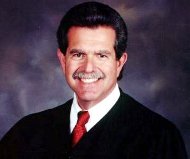Florida Appeals Court Strikes Down Loud Car Music Law
A Florida law prohibiting the blasting of loud music from automobiles violates the first amendment, the Florida Court of Appeals, Fifth District, ruled on September 16. Shannon Montgomery had been driving in Marion County with his tunes “plainly audible” from a distance of twenty-five feet, contrary to the statute. He was pulled over and police eventually discovered he was carrying cocaine and marijuana.
Montgomery moved to suppress the evidence against him, arguing state law used to justify the traffic stop was overly broad and that “plainly audible” is an arbitrary standard. The appellate judges disagreed.
“A vague statute is one that fails to give a person of common intelligence fair and adequate notice of what conduct is prohibited and which, because of its imprecision, may also invite arbitrary and discriminatory enforcement,” Chief Judge Richard B. Orfinger wrote for the three-judge panel. “We believe the statute here provides fair notice of the prohibited conduct: it is a violation to operate or amplify the sound inside a vehicle in the state of Florida, so that it is capable of being clearly heard outside of the vehicle at a distance greater than 25 feet. The distance standard provides an explicit guideline to those charged with enforcing the statute. If a law enforcement officer can hear sounds at or beyond the specified distance using his normal sense of hearing, the statute has been violated.”
In 1998, the appellate court first ruled that a law prohibiting plainly audible music from 100 feet was not vague. In 2005, the legislature responded by reducing the distance to 25 feet. The court was more sympathetic to Montgomery’s free-speech challenge.
“As previously discussed, music, including amplified music, is protected under the First Amendment,” Orfinger wrote. “Nonetheless, the government can constitutionally restrict such expression, even in a public place, if the limitations on the time, place, and manner of the protected speech are reasonable.”
As part of its 2005 changes, the legislature also added an exemption for amplified business and political speech, which doomed the law in the court’s view. The judges found that this provision inverted the proper constitutional principle that non-commercial speech be given greater protection than advertising.
“In this case, music or a religious message amplified so as to be heard twenty-five feet away from a vehicle would violate the statute, while a sound truck blaring ‘Eat at Joe’s’ or ‘Vote for Smith’ plainly audible at a great distance, would be authorized,” Orfinger wrote. “Clearly, the statute discriminates on the basis of content, not noise.”
As such, the court found the statute violated the First Amendment with a content-based restriction on free expression — a view shared by the Second District in a similar case from earlier this year. The judges here declined to apply the exclusionary rule because the police officer had no way of knowing the law he was enforcing was unconstitutional, especially since the courts had upheld an earlier version of the statute.
A copy of the ruling is available in a 90k PDF file at the source link below.
Source:
Montgomery v. Florida (Court of Appeals, State of Florida, 9/16/2011)
[Courtesy: Thenewspaper.com]
More by The Newspaper
Latest Car Reviews
Read moreLatest Product Reviews
Read moreRecent Comments
- SCE to AUX With these items under the pros:[list][*]It's quick, though it seems to take the powertrain a second to get sorted when you go from cruising to tromping on it.[/*][*]The powertrain transitions are mostly smooth, though occasionally harsh.[/*][/list]I'd much rather go electric or pure ICE I hate herky-jerky hybrid drivetrains.The list of cons is pretty damning for a new vehicle. Who is buying these things?
- Jrhurren Nissan is in a sad state of affairs. Even the Z mentioned, nice though it is, will get passed over 3 times by better vehicles in the category. And that’s pretty much the story of Nissan right now. Zero of their vehicles are competitive in the segment. The only people I know who drive them are company cars that were “take it or leave it”.
- Jrhurren I rented a RAV for a 12 day vacation with lots of driving. I walked away from the experience pretty unimpressed. Count me in with Team Honda. Never had a bad one yet
- ToolGuy I don't deserve a vehicle like this.
- SCE to AUX I see a new Murano to replace the low-volume Murano, and a new trim level for the Rogue. Yawn.


































Comments
Join the conversation
Yeah, yeah, yeah ... I know. If the music's too loud, you're too old. Well guess what. I'm too old now and I can't hear as well as I used to. But when your decibels are making my car's windows rattle, that's not freedom of speech, that's assault.
I used to routinely call the cops on the factory workers who would drive by the houses in my neighborhood at 2:00 a.m. with their stereos 'bumping'. I believe that this behavior is indeed an important form of expression, it serves to alert everyone within two square miles that the lowest possible class of individual is approaching at rapid speed (also applies to Harley riders). The cops would show up, pull them over, and discover the ubiquitous drugs, alcohol, weapons, outstanding warrants. Eventually the problem was curtailed. Point being that this type of expression, whether constitutional or not shows no regard or consideration for others. It is poor citizenship, and the people involved are usually poor citizens.